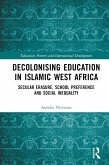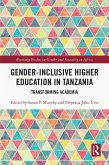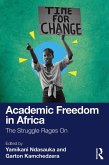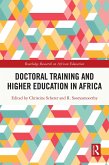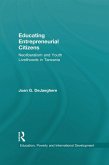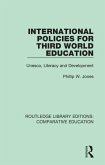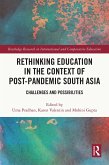Anneke Newman
Decolonising Education in Islamic West Africa (eBook, ePUB)
Secular Erasure, School Preference and Social Inequality
42,95 €
42,95 €
inkl. MwSt.
Sofort per Download lieferbar

21 °P sammeln
42,95 €
Als Download kaufen

42,95 €
inkl. MwSt.
Sofort per Download lieferbar

21 °P sammeln
Jetzt verschenken
Alle Infos zum eBook verschenken
42,95 €
inkl. MwSt.
Sofort per Download lieferbar
Alle Infos zum eBook verschenken

21 °P sammeln
Anneke Newman
Decolonising Education in Islamic West Africa (eBook, ePUB)
Secular Erasure, School Preference and Social Inequality
- Format: ePub
- Merkliste
- Auf die Merkliste
- Bewerten Bewerten
- Teilen
- Produkt teilen
- Produkterinnerung
- Produkterinnerung

Bitte loggen Sie sich zunächst in Ihr Kundenkonto ein oder registrieren Sie sich bei
bücher.de, um das eBook-Abo tolino select nutzen zu können.
Hier können Sie sich einloggen
Hier können Sie sich einloggen
Sie sind bereits eingeloggt. Klicken Sie auf 2. tolino select Abo, um fortzufahren.

Bitte loggen Sie sich zunächst in Ihr Kundenkonto ein oder registrieren Sie sich bei bücher.de, um das eBook-Abo tolino select nutzen zu können.
This book examines perceptions and experiences of Qur'anic schools in West Africa, outlining a much-needed postcolonial approach which considers the place of Islamic education within African decolonial debates about educational pluralism.
- Geräte: eReader
- mit Kopierschutz
- eBook Hilfe
- Größe: 2.79MB
Andere Kunden interessierten sich auch für
![Decolonising Education in Islamic West Africa (eBook, PDF) Decolonising Education in Islamic West Africa (eBook, PDF)]() Anneke NewmanDecolonising Education in Islamic West Africa (eBook, PDF)42,95 €
Anneke NewmanDecolonising Education in Islamic West Africa (eBook, PDF)42,95 €![Gender-Inclusive Higher Education in Tanzania (eBook, ePUB) Gender-Inclusive Higher Education in Tanzania (eBook, ePUB)]() Gender-Inclusive Higher Education in Tanzania (eBook, ePUB)42,95 €
Gender-Inclusive Higher Education in Tanzania (eBook, ePUB)42,95 €![Academic Freedom in Africa (eBook, ePUB) Academic Freedom in Africa (eBook, ePUB)]() Academic Freedom in Africa (eBook, ePUB)39,95 €
Academic Freedom in Africa (eBook, ePUB)39,95 €![Doctoral Training and Higher Education in Africa (eBook, ePUB) Doctoral Training and Higher Education in Africa (eBook, ePUB)]() Doctoral Training and Higher Education in Africa (eBook, ePUB)42,95 €
Doctoral Training and Higher Education in Africa (eBook, ePUB)42,95 €![Educating Entrepreneurial Citizens (eBook, ePUB) Educating Entrepreneurial Citizens (eBook, ePUB)]() Joan DejaeghereEducating Entrepreneurial Citizens (eBook, ePUB)46,95 €
Joan DejaeghereEducating Entrepreneurial Citizens (eBook, ePUB)46,95 €![International Policies for Third World Education (eBook, ePUB) International Policies for Third World Education (eBook, ePUB)]() Phillip W. JonesInternational Policies for Third World Education (eBook, ePUB)24,95 €
Phillip W. JonesInternational Policies for Third World Education (eBook, ePUB)24,95 €![Rethinking Education in the Context of Post-Pandemic South Asia (eBook, ePUB) Rethinking Education in the Context of Post-Pandemic South Asia (eBook, ePUB)]() Rethinking Education in the Context of Post-Pandemic South Asia (eBook, ePUB)41,95 €
Rethinking Education in the Context of Post-Pandemic South Asia (eBook, ePUB)41,95 €-
-
-
This book examines perceptions and experiences of Qur'anic schools in West Africa, outlining a much-needed postcolonial approach which considers the place of Islamic education within African decolonial debates about educational pluralism.
Dieser Download kann aus rechtlichen Gründen nur mit Rechnungsadresse in A, B, BG, CY, CZ, D, DK, EW, E, FIN, F, GR, HR, H, IRL, I, LT, L, LR, M, NL, PL, P, R, S, SLO, SK ausgeliefert werden.
Produktdetails
- Produktdetails
- Verlag: Taylor & Francis eBooks
- Erscheinungstermin: 24. Dezember 2024
- Englisch
- ISBN-13: 9781040273913
- Artikelnr.: 72288534
- Verlag: Taylor & Francis eBooks
- Erscheinungstermin: 24. Dezember 2024
- Englisch
- ISBN-13: 9781040273913
- Artikelnr.: 72288534
- Herstellerkennzeichnung Die Herstellerinformationen sind derzeit nicht verfügbar.
Anneke Newman is an anthropologist of development and Senior Postdoctoral Research Fellow at the Department of Conflict and Development Studies, University of Ghent, Belgium.
Chapter 1: Rethinking development, education and religion: A challenging
nexus
Stereotypes, silences and secular bias in policy and academic scholarship
Coloniality and the development-education-religion nexus
About us without us: Studying the 'religious Other'
Structure of the book
Chapter 2: A postsecular decolonial approach: Breaking the binaries
Introducing decolonial theory
Ontology and epistemology: 'With these threads, we weave the world'
Decolonial perspectives on the study of religion
Stories and senses: A postsecular approach to educational engagement in
Islamic West Africa
Conclusion
PART I: SECULAR BIAS IN EDUCATION POLICIES: FROM COLONISATION TO EDUCATION
FOR ALL
Chapter 3: The evolution of Islam and education in West Africa
Content and pedagogy of classical Qur'anic schools
Race, religion, capitalist extraction: Colonial schools and education
policy
Islamic modernities and education reform
Conclusion
Chapter 4: Coloniality of secularity and Education For All
The 'talibé problem': Development critiques of child begging
Assumptions about Qur'anic schools and 'quality education'
The instrumentalisation of Islamic education under EFA
Conclusion
PART II: PATTERNS OF EDUCATIONAL ENGAGEMENT IN NORTHERN SENEGAL
Chapter 5: Understanding Qur'anic school preference
Coloniality of secularity in frameworks for understanding educational
decision-making
Researching education in Medina Diallobé village
Explaining Qur'anic school preference
Choosing the Qur'anic school: An increasingly complex decision
Conclusion
Chapter 6: Racial hierarchies and Islamic education: From exclusion to
resistance
Understanding descent-based inequalities in Islamic West Africa
Knowledge-power, education and social mobility: An evolving relationship
Islamic education in the Futa Tooro region: The 'final frontier'
Using Islamic knowledge to resist racialised exclusion
Conclusion
Chapter 7: Islamic knowledge and women's agency
Coloniality in discussions about African Muslim women's agency
Situating female Islamic education in northern Senegal
Women mobilising Islamic knowledge in Medina Diallobé
Islamic education and women's empowerment: Implications for policy
Conclusion
Chapter 8: Pursuing Islamic and state school knowledges: 'You need both'
Social inequalities, onto-epistemologies and temporalities in young
people's trajectories
'Hierarchical complementarity': Islamic and state school knowledges
Mixed trajectories: Common concerns, diverse strategies
Barriers to educational pluralism in Senegal
Conclusion
PART III: DECOLONISING EDUCATION IN ISLAMIC WEST AFRICA: FROM RESEARCH TO
POLICY
Chapter 9: Embracing African Islamic knowledge traditions: From critique to
'border praxis'
Overcoming coloniality in education and development scholarship
Decolonial research methodologies in comparative education
Towards pluralistic education policy and programming
nexus
Stereotypes, silences and secular bias in policy and academic scholarship
Coloniality and the development-education-religion nexus
About us without us: Studying the 'religious Other'
Structure of the book
Chapter 2: A postsecular decolonial approach: Breaking the binaries
Introducing decolonial theory
Ontology and epistemology: 'With these threads, we weave the world'
Decolonial perspectives on the study of religion
Stories and senses: A postsecular approach to educational engagement in
Islamic West Africa
Conclusion
PART I: SECULAR BIAS IN EDUCATION POLICIES: FROM COLONISATION TO EDUCATION
FOR ALL
Chapter 3: The evolution of Islam and education in West Africa
Content and pedagogy of classical Qur'anic schools
Race, religion, capitalist extraction: Colonial schools and education
policy
Islamic modernities and education reform
Conclusion
Chapter 4: Coloniality of secularity and Education For All
The 'talibé problem': Development critiques of child begging
Assumptions about Qur'anic schools and 'quality education'
The instrumentalisation of Islamic education under EFA
Conclusion
PART II: PATTERNS OF EDUCATIONAL ENGAGEMENT IN NORTHERN SENEGAL
Chapter 5: Understanding Qur'anic school preference
Coloniality of secularity in frameworks for understanding educational
decision-making
Researching education in Medina Diallobé village
Explaining Qur'anic school preference
Choosing the Qur'anic school: An increasingly complex decision
Conclusion
Chapter 6: Racial hierarchies and Islamic education: From exclusion to
resistance
Understanding descent-based inequalities in Islamic West Africa
Knowledge-power, education and social mobility: An evolving relationship
Islamic education in the Futa Tooro region: The 'final frontier'
Using Islamic knowledge to resist racialised exclusion
Conclusion
Chapter 7: Islamic knowledge and women's agency
Coloniality in discussions about African Muslim women's agency
Situating female Islamic education in northern Senegal
Women mobilising Islamic knowledge in Medina Diallobé
Islamic education and women's empowerment: Implications for policy
Conclusion
Chapter 8: Pursuing Islamic and state school knowledges: 'You need both'
Social inequalities, onto-epistemologies and temporalities in young
people's trajectories
'Hierarchical complementarity': Islamic and state school knowledges
Mixed trajectories: Common concerns, diverse strategies
Barriers to educational pluralism in Senegal
Conclusion
PART III: DECOLONISING EDUCATION IN ISLAMIC WEST AFRICA: FROM RESEARCH TO
POLICY
Chapter 9: Embracing African Islamic knowledge traditions: From critique to
'border praxis'
Overcoming coloniality in education and development scholarship
Decolonial research methodologies in comparative education
Towards pluralistic education policy and programming
Chapter 1: Rethinking development, education and religion: A challenging
nexus
Stereotypes, silences and secular bias in policy and academic scholarship
Coloniality and the development-education-religion nexus
About us without us: Studying the 'religious Other'
Structure of the book
Chapter 2: A postsecular decolonial approach: Breaking the binaries
Introducing decolonial theory
Ontology and epistemology: 'With these threads, we weave the world'
Decolonial perspectives on the study of religion
Stories and senses: A postsecular approach to educational engagement in
Islamic West Africa
Conclusion
PART I: SECULAR BIAS IN EDUCATION POLICIES: FROM COLONISATION TO EDUCATION
FOR ALL
Chapter 3: The evolution of Islam and education in West Africa
Content and pedagogy of classical Qur'anic schools
Race, religion, capitalist extraction: Colonial schools and education
policy
Islamic modernities and education reform
Conclusion
Chapter 4: Coloniality of secularity and Education For All
The 'talibé problem': Development critiques of child begging
Assumptions about Qur'anic schools and 'quality education'
The instrumentalisation of Islamic education under EFA
Conclusion
PART II: PATTERNS OF EDUCATIONAL ENGAGEMENT IN NORTHERN SENEGAL
Chapter 5: Understanding Qur'anic school preference
Coloniality of secularity in frameworks for understanding educational
decision-making
Researching education in Medina Diallobé village
Explaining Qur'anic school preference
Choosing the Qur'anic school: An increasingly complex decision
Conclusion
Chapter 6: Racial hierarchies and Islamic education: From exclusion to
resistance
Understanding descent-based inequalities in Islamic West Africa
Knowledge-power, education and social mobility: An evolving relationship
Islamic education in the Futa Tooro region: The 'final frontier'
Using Islamic knowledge to resist racialised exclusion
Conclusion
Chapter 7: Islamic knowledge and women's agency
Coloniality in discussions about African Muslim women's agency
Situating female Islamic education in northern Senegal
Women mobilising Islamic knowledge in Medina Diallobé
Islamic education and women's empowerment: Implications for policy
Conclusion
Chapter 8: Pursuing Islamic and state school knowledges: 'You need both'
Social inequalities, onto-epistemologies and temporalities in young
people's trajectories
'Hierarchical complementarity': Islamic and state school knowledges
Mixed trajectories: Common concerns, diverse strategies
Barriers to educational pluralism in Senegal
Conclusion
PART III: DECOLONISING EDUCATION IN ISLAMIC WEST AFRICA: FROM RESEARCH TO
POLICY
Chapter 9: Embracing African Islamic knowledge traditions: From critique to
'border praxis'
Overcoming coloniality in education and development scholarship
Decolonial research methodologies in comparative education
Towards pluralistic education policy and programming
nexus
Stereotypes, silences and secular bias in policy and academic scholarship
Coloniality and the development-education-religion nexus
About us without us: Studying the 'religious Other'
Structure of the book
Chapter 2: A postsecular decolonial approach: Breaking the binaries
Introducing decolonial theory
Ontology and epistemology: 'With these threads, we weave the world'
Decolonial perspectives on the study of religion
Stories and senses: A postsecular approach to educational engagement in
Islamic West Africa
Conclusion
PART I: SECULAR BIAS IN EDUCATION POLICIES: FROM COLONISATION TO EDUCATION
FOR ALL
Chapter 3: The evolution of Islam and education in West Africa
Content and pedagogy of classical Qur'anic schools
Race, religion, capitalist extraction: Colonial schools and education
policy
Islamic modernities and education reform
Conclusion
Chapter 4: Coloniality of secularity and Education For All
The 'talibé problem': Development critiques of child begging
Assumptions about Qur'anic schools and 'quality education'
The instrumentalisation of Islamic education under EFA
Conclusion
PART II: PATTERNS OF EDUCATIONAL ENGAGEMENT IN NORTHERN SENEGAL
Chapter 5: Understanding Qur'anic school preference
Coloniality of secularity in frameworks for understanding educational
decision-making
Researching education in Medina Diallobé village
Explaining Qur'anic school preference
Choosing the Qur'anic school: An increasingly complex decision
Conclusion
Chapter 6: Racial hierarchies and Islamic education: From exclusion to
resistance
Understanding descent-based inequalities in Islamic West Africa
Knowledge-power, education and social mobility: An evolving relationship
Islamic education in the Futa Tooro region: The 'final frontier'
Using Islamic knowledge to resist racialised exclusion
Conclusion
Chapter 7: Islamic knowledge and women's agency
Coloniality in discussions about African Muslim women's agency
Situating female Islamic education in northern Senegal
Women mobilising Islamic knowledge in Medina Diallobé
Islamic education and women's empowerment: Implications for policy
Conclusion
Chapter 8: Pursuing Islamic and state school knowledges: 'You need both'
Social inequalities, onto-epistemologies and temporalities in young
people's trajectories
'Hierarchical complementarity': Islamic and state school knowledges
Mixed trajectories: Common concerns, diverse strategies
Barriers to educational pluralism in Senegal
Conclusion
PART III: DECOLONISING EDUCATION IN ISLAMIC WEST AFRICA: FROM RESEARCH TO
POLICY
Chapter 9: Embracing African Islamic knowledge traditions: From critique to
'border praxis'
Overcoming coloniality in education and development scholarship
Decolonial research methodologies in comparative education
Towards pluralistic education policy and programming

